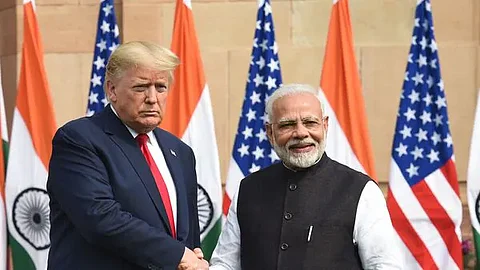

US President Donald Trump has claimed that Indian Prime Minister Narendra Modi assured him India would halt oil imports from Russia — a statement that has stirred both curiosity and scepticism in global diplomatic circles.
Speaking at a White House event on October 15, Trump said Modi had “assured” him that India would no longer buy Russian crude, calling it a “big step” in Washington’s attempt to pressure Moscow amid the war in Ukraine. He added that the US now planned to “get China to do the same”.
For context, India and China have been the largest buyers of Russian seaborne crude since 2022, taking advantage of discounted prices after Western sanctions cut Russia off from traditional energy markets.
However, the Indian embassy in Washington did not immediately respond to Reuters’ request for comment, leaving Trump’s assertion unconfirmed.
If true, the move would mark a major policy shift. Russia has been India’s top oil supplier for months, exporting around 1.62 million barrels per day in September — roughly one-third of India’s total crude imports. Indian officials have repeatedly argued that these imports are vital for maintaining energy security, especially as global prices remain volatile.
Replacing Russian crude would likely increase India’s import costs, although recent declines in global oil prices may cushion the impact. Brent crude, the international benchmark, fell to a five-month low on October 15 due to growing concerns about a market surplus.
Trump admitted that India could not “stop immediately”, saying it would be “a little bit of a process, but that process will be over soon”.
Trump’s comments come as Washington seeks to tighten the squeeze on Moscow’s energy revenues by leaning on key importers rather than relying solely on sanctions.
Later on the same day, US Treasury Secretary Scott Bessent said he had told Japan’s finance minister Katsunobu Kato that the US expects Japan to stop importing Russian energy as well. The Japanese government has yet to issue a statement on the matter.
Trump’s approach has been notably bilateral — urging direct commitments from partner nations rather than waiting for collective agreements through global bodies.
Trump’s comments come at a sensitive moment in US–India relations. Earlier this year, Washington imposed a 25% tariff on Indian exports after trade talks failed, later doubling the rate following India’s continued purchase of Russian oil. India criticised the move, noting that other major importers like China and Turkey faced no comparable penalties.
Analysts say that while India’s ties with Russia are long-standing, its broader strategic partnership with the US complicates matters. A complete halt to Russian oil could draw India closer to Western policy lines — but at the cost of higher energy prices and reduced supply flexibility.
India’s official stance so far has been that it will prioritise its national energy interests. Whether Modi has in fact made a commitment to stop Russian oil imports remains to be seen.
The latest exchange also followed a meeting between Modi and Sergio Gor, Trump’s nominee for US ambassador to India, where discussions reportedly covered defence, trade, and technology. Gor’s close ties to Trump have been viewed as a sign of Washington’s intent to strengthen its partnership with New Delhi.
But as of now, there’s no official confirmation from India about any policy shift. For a country that’s walked a careful line between strategic autonomy and global diplomacy, this could prove one of its most closely watched moves yet.